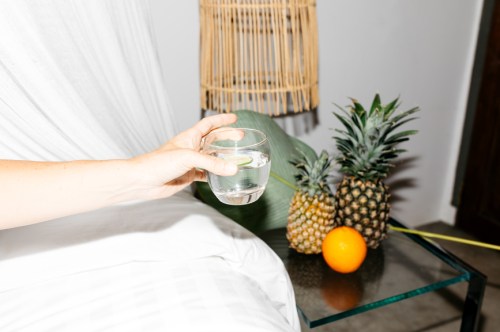The Gross Reason Why You Shouldn’t Drink That Glass of Water You Left Out Overnight, According to a Toxicologist
Have you ever sipped a less than pleasant tasting glass of water in the morning? There’s reason your water tastes weird in the morning.

I can’t think of anything that makes me feel more like a character in Downton Abbey than the little glass water decanter I keep on my bedside table. It is a clear, deep blue glass bottle with pretty ridges and a cup that doubles as a lid. I typically fill it up every other day and rinse it with warm water and soap when I do.
Experts in This Article
medical toxicologist and co-medical director of the National Capital Poison Center
When I forget that sacred step of giving my water decanter a frequent rinse or I leave the lid off overnight, however, it becomes exceedingly obvious the second I take a sip before bed. The water tastes stale, slightly bitter, and distinctly musty? Blech—not fun.
If this has ever happened to you, you know it can be the exact opposite of a pleasant, thirst-quenching hydration moment. Believe it or not, there’s a reason your glass of water tastes weird when it’s left out in the open for a few hours or entire day, and it’s… pretty icky.
Why your glass of water tastes weird
“When tap water sits out overnight, it is exposed to air, which allows carbon dioxide—which is present in air—to dissolve in the water,” says Kelly Johnson-Arbor, MD, an emergency room physician, toxicology specialist, and the medical director of the National Capital Poison Center. “Carbon dioxide is converted in our bodies to carbonic acid by an enzyme called carbonic anhydrase. Carbonic anhydrase also converts carbonic acid back to carbon dioxide.”
Translation? The longer your water sits out, the more acidic compounds develop in it that that change the flavor over time. The acidic flavor from the carbonic acid it what gives your glass of H20 that distinctly stale taste when you sip it after letting it sit out overnight. “When there is an excess of carbon dioxide in drinking water, we taste more carbonic acid, since carbon dioxide is converted to carbonic acid by carbonic anhydrase. The increased acidity of the water it what causes the water to taste bitter or stale,” says Dr. Johnson-Arbor.
Good to know: “The bad taste we get from C02 exposure is unpleasant but not dangerous to our health. A bigger concern is bacterial production: If you drink from a glass and then let it sit out overnight, bacteria present on the glass can accumulate and potentially cause hazardous health effects,” says Dr. Johnson-Arbor. It’s best not to let drinks or water sit out for long periods of time, which she defines as more than a few hours.
BTW, this phenomenon of carbonic acid-induced flavor changing is not unique to water. There are also medications that affect the level of carbonic anhydrase in our bodies; this includes the drugs acetazolamide (Diamox) and dorzolamide (Trusopt), according to Dr. Johnson-Arbor. Because these medications can cause abnormal levels of carbonic acid in the body, they can also cause alterations in taste, similar to the way that your water tastes more blegh after sitting out in the open. Putting a lid on it or using a closed water bottle instead can help stave off some of those unpleasant flavors, as well as potential bacterial production.
Now, did I know this when I chose a glamorous decanter that came with a trusty lid? No. Do I now feel even better about the splurge purchase? Absolutely yes.
How to keep your water tasting great
Of course, a simple way to ensure you always have a great-tasting glass or carafe of water is replacing the water as frequently as possible (ideally, this should happen every time you go for a drink) and making sure to clean the receptacles daily.
Keep in mind that it’s more common for folks to reuse—and, ahem, not wash—water bottles than cups. But again: Both should be cleaned between uses and not allowed to sit for more than a few hours so that bacteria doesn’t have the chance to grow and thrive.
“Temperature also has effects on taste. Cold water makes our mouths feel more ‘wet’ and can be, therefore, more pleasant to drink than warm water,” says Dr. Johnson-Arbor. So be careful not to let the temperature of your water mask the flavor caused by carbonic acid or bacterial growth.
TL; DR? Getting a fresh glass of water for yourself in the morning—rather than going for that two day old cup on your bedside table—can protect you from a flat C02 taste and extra bacteria that have had some time to replicate. Does that mean I will be getting rid of my precious decanter? Definitely not, but catch me continuing to wash it daily.
Sign Up for Our Daily Newsletter
Get all the latest in wellness, trends, food, fitness, beauty, and more delivered right to your inbox.
Got it, you've been added to our email list.










